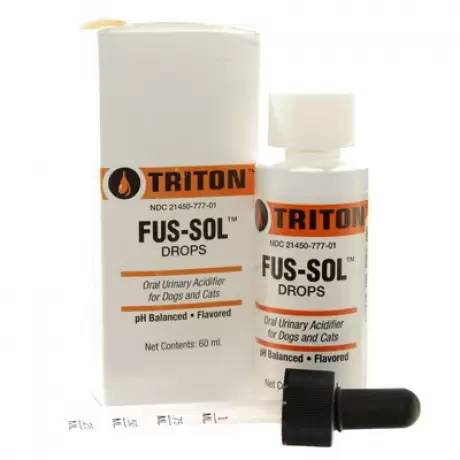
FUS-SOL Drops
FUS-SOL Drops
Fus-Sol Drops have been discontinued by the manufacturer. You may wish to see if your veterinarian recommends another methionine supplement to acidify urine, such as Methigel or DL-Methionine Tablets.
What are FUS-SOL Drops for Dogs and Cats?
- FUS-SOL Drops work to acidify urine.
- This may help reduce the formation of certain kinds of urinary stones.
- FUS-SOL Drops are a pH balanced, flavored liquid that can be administered orally or mixed with food.
Why do cats and dogs use FUS-SOL Drops?
- If your dog or cat has been diagnosed with a urinary problem, such as the formation of stones, your veterinarian may prescribe a urinary acidifier such as FUS-SOL Drops.
What problems could my dog or cat have with FUS-SOL Drops?
- Methionine is not recommended for kittens, or for animals with renal failure, pancreatic disease, or liver insufficiency.
- Possible adverse effects include gastrointestinal upset. If given with food, methionine may have reduced side effects and increased efficacy.
- Methionine can be given with food or mixed in food unless otherwise instructed by your pet's veterinarian.
- If too much methionine is given or if overdosage occurs, it can lead to anorexia, uncoordinated muscle movement, and cyanosis (a blue or purple pigmentation of the skin due to low oxygen levels).
How do you use FUS-SOL Drops?
- Give as directed by your veterinarian.
- Discuss the use of new supplements with your veterinarian before you start giving them.
What is in FUS-SOL Drops?
- FUS-SOL Drops contain Ammonium Chloride, DL-Methionine, and B-complex vitamins to help lower the acidity of urine.
Will I get what I see in the picture?
- FUS-SOL is a brand name. You will receive the exact brand that you request.
Is it important for my dog or cat to finish all of the FUS-SOL Drops?
- Dogs and cats may use FUS-SOL Drops for different lengths of time. Please consult your veterinarian if you have any questions.
No Reviews Yet
Q & A
-
My 3 year old Hava-shire threw up the dose within 15 minutes of administration. She had not eaten for about 10 hours. Should this medication be given on a full stomach??
-
According to the product package label as well as Plumb’s Veterinary Handbook, the medication may be mixed with food to allow better palatability of the product.
Verified Answer
-
-
Can this cause diarrhea in my cat? We tried this once took him off of it because all of a sudden he started having loose stools, now we're clearing that up with antibiotics, but the veterinarian wants him to go back on this. I want to know first could this have been the cause. Thanks so much.?
-
According to the manufacturer, Fus-Sol drops main side effects involve GI upset. Therefore, nausea vomiting, and diarrhea are all possible adverse effects that can occur with the use of this medication. If the loose stools have cleared with antibiotics, you could try giving the Fus-Sol drops again. If diarrhea occurs, contact your veterinarian and they can determine if it is best to discontinue this product and try something else.
Verified Answer
-
-
My 16 year old cat has been taking Uroeze for years to prevent crystals from forming in his urine and has been doing very well on that medication - no crystals! Recently, the manufacturer of Uroeze has stopped manufacturing this medication (according to them, it doesn't sufficiently add to their bottom line). So, I am wondering if Fus-Sol drops is a good alternative to Uroeze since the main ingredient in both is ammonium chloride. Thanks.?
-
Fus-Sol is a medication to acidify urine in dogs and cats. It contains 100mg of ammonium chloride per 0.5ml, dl-methionine, and b-complex vitamins. There is no evidence available comparing the efficacy of Fus-sol and Uroeze. The manufacturer recommends a dose of 0.5ml per 10 pounds of body weight, twice daily. Speak with your veterinarian to determine if Fus-sol drops would be an appropriate substitute for use in your cat. Thank you, VetRxDirect
Verified Answer
-
Displaying Questions 1 - 3

